Abstract
This paper deals with the development of an expert system which is valid to optimize the transients arising in adaptive control via the use of a logic formal structure previously described. Its practical experimentation leads to good applicability results in a context of rule-based knowledge. A supervisor to improve the transient performance in the adaptive control of a planar robot is designed based on an expert network organization. Apart form the basic adaptation scheme consisting of an estimation algorithm plus an adaptive controller, two additional coordinated expert systems are used to update an adaptation gain and the sampling period with a master expert system coordinating both above expert systems.
Similar content being viewed by others
References
Buchanan, B. G. and Shortliffe, E. H.: Completeness and Consistency in a Rule-Based System, Chapter 8, Rule-Based Expert Systems, Addison-Wesley series in Artificial Intelligence, Addison-Wesley, Reading, MA, 1984.
de la Sen, M.: On-line optimisation of the free parameters in discrete adaptive control systems, IEE Proceedings-D (Control Theory and Applications) 131(4) (1984), 146–157.
de la Sen, M.: A method for improving the adaptation transients using adaptive sampling, Internat. J. Control 40(4) (1984), 639–665.
de la Sen, M.: Adaptive sampling for improving the adaptation transients in hybrid adaptive control, Internat. J. Control 41(5) (1985), 1189–1205.
de la Sen, M.: Logical formal description of expert systems, (Preliminary results), in: IEEE Region 10 Conference. Tencon 68, 1987, pp. 816–820.
de la Sen, M. and Almansa, A.: Adaptive control of manipulators with supervision of the sampling rate and free-parameters of the adaptation algorithm, in: 1999 American Control Conference, San Diego, CA, 1999, pp. 4553–4557.
de la Sen, M. and Miñambres, J. J.: An expert system for optimal adaptive control automation, Novatica 12(69) (1987), 33–38.
de la Sen, M. and Miñambres, J. J.: An expert system for optimal adaptive control automation, in: Fault Design and Reliability. Knowledge Based and Others Approaches, Vol. 9, Pergamon Press, 1987, pp. 75–83.
Etxebarria, V. and de la Sen, M.: Adaptive control of robot manipulators with improved adaptation transients using neural networks, Internat. J. Intelligent Control Systems 3(4) 549–569.
Gaul, W. and Schader, M.: Data Analysis, Computer Science Series, Springer-Verlag, Berlin, 2000.
Georgeff, M. P.: An expert system for representing procedural knowledge, in: Joint Services Workshop on Artificial Intelligence in Maintenance, Volume 1: Proceedings, Air Force Base, Boulder, CO, San Antonio, TX, 1983.
Georgeff, M. P. and Firschein, O.: Expert systems for space station automation, Control and Systems Magazine 5 (Nov. 1985), 3–8.
Jackson, P.: Introduction to Expert Systems, International Computer Scince Series, Addison-Wesley, Harlow, 1999.
Lin, Z. Q. and Miyamoto, S.: Soft and Human-Centered Machines, Computer Science Series, Springer-Verlag, Berlin, 2000.
Luger, G. F. and Stubblefield, W. A.: Artificial Intelligence and the Design of Experts Systems, Benjamin-Cummings Series in Artificial Intelligence, Benjamin-Cummings, Redwood City, CA, 1989.
Milne, R. and Trave-Massuyes, L.: The successful application of modern artificial intelligence technologies, Unicom Seminars, Uxbridge, Middlesex, 1995.
Sarjoughian, H. S. and Cellier, F. E.: Discrete Event Modelling and Simulation Technologies, Computer Science Series, Springer-Verlag, Berlin, 2000.
Scarl, E. A., Jamilson, J., and Delaune, C.: Knowledge-based fault monitoring and diagnosis in space shuttle propellant loading, Interim Report, Cambridge, MA, MITRE, 1984.
Soto, J. C., de la Sen, M., and Miñambres, J. J.: Expert systems in monitoring chemical reactors, in: IASTED Internat. Symp. Applied Informatics, Grindelwald, 1988, pp. 163–166.
SSAS: Autonomous Systems and Assembly, Final Report MCR 84-1878, Denver, CO, Martin Marietta Aerospace, Nov. 1984.
Veloso, M. and Wooldridge, M. J.: Artificial Intelligence Today: Recent Trends and Developments, Lecture Notes on Artificial Intelligence 1600, Springer-Verlag, New York, 1999.
Author information
Authors and Affiliations
Rights and permissions
About this article
Cite this article
De la Sen, M., Miñambres, J.J., Garrido, A.J. et al. Basic Theoretical Results for Describing Expert Systems. Application to the Supervision of Adaptation Transients in a Planar Robot. Journal of Intelligent and Robotic Systems 35, 83–109 (2002). https://doi.org/10.1023/A:1020249704391
Issue Date:
DOI: https://doi.org/10.1023/A:1020249704391




